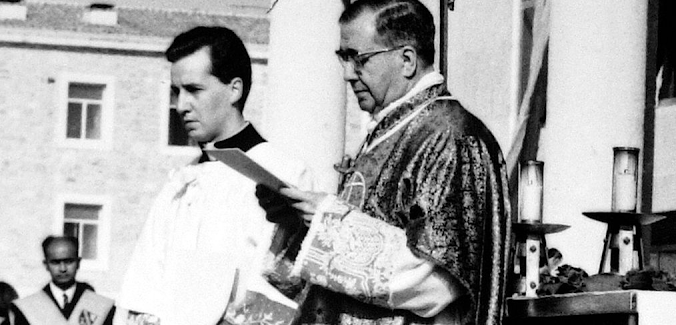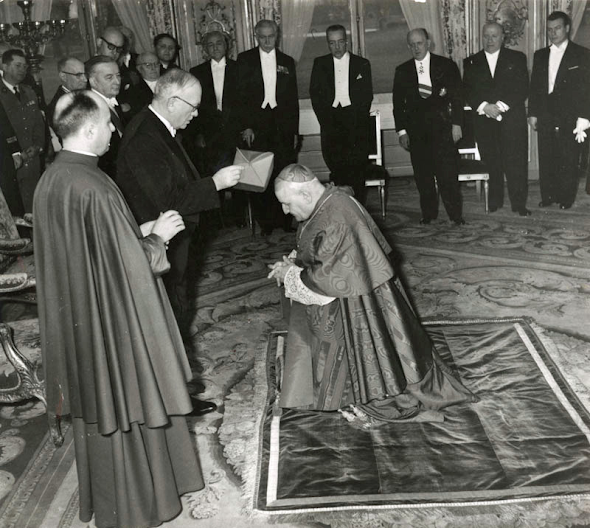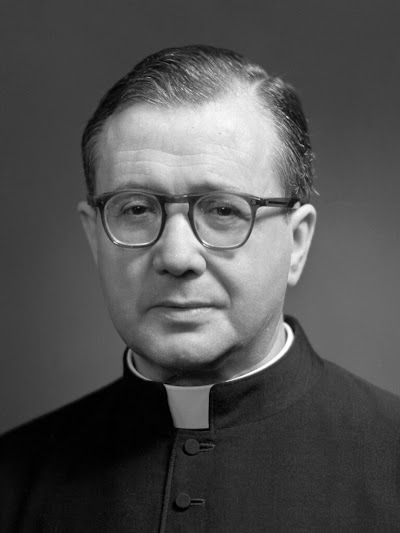OPUS DEI - TROJAN HORSE OF LIBERALISM IN THE CHURCH (PART VI)
 |
| Escriba y Albás during his infamous homily delivered at the University of Navarra, October 8, 1967, appropriately titled by Opus Dei themselves, "Passionately Loving the World". |
Part I - A Jewish Branch of Freemasonry?
Part II - Secularism and Liberalism: the Twin Pillars of the Work
Part III - Work as Means of "Sanctification"
Part IV - Opus Dei: "Reconciling" the City of God and the City of Man
Part V - The Work: Precursor to Vatican II
Escriba: a “vocation” to the world,
not to Christ’s priesthood
“No man can serve two
masters. For either he will hate the one, and love the other: or he will
sustain the one, and despise the other.” Matthew 6:24
Escriba himself
declared: “I NEVER thought of becoming a priest, or of dedicating myself
to God. That problem had never presented itself to me, because I thought it
was not something for me. What is more: the thought of possibly becoming a priest
someday BOTHERED me, in such a way that I felt myself an anticlerical.”
[1] We have clearly highlighted “never” in Escriba’s own “confession”:
that is, he never had a vocation to
the priesthood – neither at a point in time long before entering the priesthood
or immediately before – and what is more such a thought bothered him. Escriba, the self-described anti-clerical in his
youth, did not appear to overcome either this mind-set or improve his spiritual
life by the time he set upon his ecclesiastical career: “when the Lord willed that I should begin
working in Opus Dei, I did not have a single virtue, or a single peseta [Spanish currency].” Here, he
somehow links his decision to enter the seminary with the founding of Opus Dei,
even though this was still some years in the future. The point is, his
“vocation” – which was no real vocation – only
acquired “meaning” to him retrospectively
in his later decision to found the Work with its lay mentality. Which is to
say, to him, the priesthood only acquired meaning from a secular perspective, when he realized that he could utilize it as a means
to fully embrace the world via his “Work”. It is clear that before his
priestly ordination, Escriba never
envisaged himself becoming a Catholic priest in the commonly understood of the
word: “I realized that that was
not what God was asking me: I did not want to be a priest, to be the priest
– ‘el cura’ – as they say in Spain.…
I did not desire for myself such a priesthood.” [2] Thus, with no real
Catholic vocation, he entered the seminary through other ulterior motives as we
will see shortly.
Alas, his time in the seminary did not seem to be spent trying to
overcome his anticlericalism and grow in the virtues – above all, humility –,
and indeed one of his seminary professors during the academic year 1920-21
noted that he was a “fickle and proud” student who had to be reprimanded for
quarrelling. [3] Don Carlos Albás, Escribá’s uncle, who intimately knew his
nephew, and therefore, his interior spiritual disposition, refused to attend
his nephew’s first mass celebrated in 1925, despite the fact that this is traditionally
a key event gathering the new priest and his most intimate connections. [4] Those
who knew him in his youth found him a closed, mediocre character showing little
interest in things. [5] Former numerary Miguel Fisac, who had known intimately
the “Father” since the earliest days of the Work (and despite this was
forbidden from testifying before the “beatification” process), recalled details
in accordance with this general picture, noting his somewhat careless attitude,
and that – quite in accordance with his lay, worldly outlook – he “liked to
sing frivolous songs.” [6]
Most seemed to agree that Escriba had a certain tendency towards
self-idolatry, which throughout his life expressed itself in a latent – and
not-so latent – pride that occasionally expressed itself quite explicitly. Perhaps
this was most paradigmatically expressed when the “Father” told a gathering of
students in London, “I have known several popes, you all know numerous bishops,
but you have only known a single ‘founder’
and God will call you to account for having lived in the time of the ‘Father’.”
[7] When the Count of Barcelona, Don Juan de Borbón visited the “Father” in his
mansion in Rome, Escriba showed him the prominent place – somewhat set apart
from the rest – in the chapel where he offered this “prayer” to God daily: “Lord, Josemaría has done much for the Church.”
(!) [8] A certain scene in Luke’s Gospel of two opposing figures offering their
prayers to God – one humble and contrite, the other pharisaical and proud,
leaving the Temple unjustified – easily comes to mind with this anecdote. Jaime
Peñafiel, who had known the “Father” and was even willing to keep silent on
certain of his faults for the sake of Christian charity, had this to say on
Escriba’s root sin: “José María
Escriba [y] Albás – and not ‘de Balaguer’, was a man possessed by the sin of
the [fallen] angels, which is none other than that of pride, in addition to
vanity, which made him renounce his maternal last name to differentiate
himself from the rest of his family with the same modest lineage, but also to claim the noble rank of Marquis of Peralta…”
[9]
According to the late Father of the Church, the Gallican St Caesarius of
Arles, humility and pride are the
distinguishing marks separating the citizens of the Heavenly City from those of
the Earthly one. Using the Augustinian imagery of the two Cities, in sermon no.
233 he stated that the humble one – Christ – builds the Heavenly, the City of
God, while the proud one – the Devil – builds the Earthly one, the City of the
Devil. Accordingly, the sons of God and the Devil are recognized according to
their humility or pride: “The sons of God
and of the devil are not distinguished from each other except through humility
and pride. Whenever you see a proud man, do not doubt that he is a son of the
devil; whenever you see a humble person, you should believe with confidence
that he is a son of God.” [10] With this in mind, Escriba’s well known
pride certainly does not place him in a favourable position with respect to the
two Cities. On February 14, 1975 in Venezuela before a gathering of his
followers, he made a startling statement that may even be an unwitting
admission about the nature of the “spirit” which had thus far led his life, a
“spirit” that would be in perfect conformity with his root sin. When asked
about his views regarding confession for children, he answered as follows:
“Bring the children over to God, before the devil enters into them. Believe me,
you will grant them a great blessing. I
say this from experience, from the experience of thousands and
thousands of souls, and from personal
experience.” This statement was made after he had lied through his
teeth saying he had spent, “many thousands
of hours confessing children in the poor slums of Madrid.” According to the
testimony of Fisac, he never once saw him in the company of any poor person. Moreover, such an
enthusiastic participation in the sacrament of penance as Escriba describes it
would virtually have been a fulltime occupation. Was Escriba saying, a few
short months before his death, that he knew from “personal experience” that the devil once had the chance to “enter into” his soul? [11]
The aforementioned Miguel Fisac thought that Escriba was forced to join
the seminary due to the financial circumstances of his family. [12] Escriba’s
father, in financial ruin, was unable to pay for the university costs of his
son, thus leaving the priesthood as the only available career path for his son.
Escriba, the anti-clerical, proud and lukewarm soul that had never entered the
seminary with a real vocation was clearly not disposed under such a set of
circumstances to adopt a humble spiritual disposition that would allow him to grow
in holiness. It is further not difficult to see that, in this context, a man
probably irritated and bored due to finding himself in a life situation he
never desired for himself, and for whom applying the fruits of a real vocation
was the farthest thing from his mind, would have naturally been drawn towards an
idea that seemed novel, exciting, and revolutionary drawn out of the heterodox,
modernist and liberal ecclesial milieu of his time. And as we have seen, the
arch-heretical Chardin’s Divine Milieu
could well have served as a prime source of inspiration for Escriba’s equally
heterodox “theology of work”. If one considers the regrettable spiritual state
of a liberal priest desperately in search of an “escape valve” to release the
full strength of the liberal and secular forces in the deepest recesses of his
heart with the help he doubtless received from “certain” connections who did
not have the best interests of the Church in mind, the rationale and impetus
for how something as heterodox as “Opus Dei” could ever have been conceived is
easier to understand.
In a talk, Escriba himself explained why he
decided to become a priest: “ ‘Why did I become a priest?’, he said
on the anniversary of his ordination, ‘Because I believed that in this way
it would be easier to fulfill the will of God, which I did not [yet] know.
Since some eight years before my ordination I had a premonition but I did not
know what it was, and I did not know until 1928. That is why I became a
priest.’ ” It is again clear from these words
that, as we have seen, the “Founder” never experienced a direct “calling” to
the priesthood, that is, he never experiencing a real Catholic vocation. He did
not become a priest as an end in itself, the outcome of a specific vocation and
call by God, but merely as a means
whereby he could attain something else,
which he “did not [yet] know” at the time either of entering the seminary or
even of becoming a priest! He did not know, or what is more likely,
flatly rejected the “will of God” for consecrated religious such as priests
– to act as channels of divine grace for the sanctification of souls – at the time of his first mass, which makes
the absence of his uncle Don Carlos Albás in that event all the more
understandable! What is more, by proposing to himself that the priesthood
was a mere means for attaining some
other higher goal of which he had some vague premonition, he is in fact
subordinating the priesthood to that higher goal. The ultimate “goal” for him
was not the priesthood in itself but that something
else which he alludes to without clearly specifying what it was. In reality,
this vague premonition is likely a description of his restless soul trying to
find some end other than the
priesthood that would fully satisfy his proud, worldly soul with its inherent
lay mentality and anticlerical outlook. And as the years progressed,
this vague notion of creating something big that would satisfy his
hyper-inflated ego and sense of self-importance must have gradually coalesced
into what became known as “Opus Dei”. Thus retroactively,
when he spoke those words we have quoted from 1973, despite the fact that the
priesthood is the highest vocation instituted by Christ, he effectively
described his “vocation” to Opus Dei as a much higher one. And following from
this principle, one observes that in practice, numeraries are often ordained
into the priesthood without them necessarily having a real vocation, since the
priesthood in Opus Dei is merely a means to some other higher ends.
Therefore,
everything now becomes clear: Escriba, who never had a vocation to the
priesthood, felt himself in his deepest marrow as a fully secular “ordinary
man” with a lay mentality, albeit one who had to be a “priest” as part of his
daily routine or “work”. Bernal himself in his hagiographical account of the
“Founder” confirms this: “And he also viewed the priestly ministry
as a professional, ordinary job, as a work of God.” [14] Because
for Escriba the priesthood was an accidental, not a substantial part of his
“vocation”, which ultimately was a lay one. This idea is very clearly expressed
by Bernal in this same work which we have already cited in part II but is most
appropriate to reiterate again at the conclusion of this study: “it is…clear
that in the mind of the Founder of Opus Dei, for us the priesthood is a
circumstance, an accident, because – within the Work – priests and the
laity have the same vocation. In Opus Dei we are all equal.” [15]
Thus his calls for both the laity and priesthood (which he conflated to a
degree dangerously close to that of the Protestants) to fully immerse
themselves in the world with a secular mentality and his “passionate” love for
the world. He thus did not feel that Christ had called him “out of the world” because he was of the world (cf John
15:19), a world which he tenaciously clung to with all the might of his
misguided “faith” and his heretical theology of “salvation through work”.
We
end this study with the following words by Escriba, uttered about a year before
his death to a gathering of laypeople, and serve as a fitting conclusion
confirming everything we have said about the core essence undergirding the
spirituality of “Saint” José María Escriba y Albás and his “Work”, a “Work” fundamentally based on gnostic-Kabbalistic
principles which is certainly not that of God: “MY VOCATION IS THE SAME AS
YOURS. I NEVER HAD ANY OTHER ONE. That is why, I do not offend consecrated religious…, if I
love you in a very special manner. It is
a particular obligation of fraternity.”
[16]
“But prove all things; hold fast that which
is good.” 1 Thessalonians 5:21; “Therefore,
brethren, stand fast; and hold the traditions which you have learned, whether
by word, or by our epistle.” 2 Thessalonians 2:15
“But though we, or an angel from heaven,
preach a gospel to you besides that which we have preached to you, let him be
anathema.” Galatians 1:8
“And you shall be hated by all men for my name's sake: but he that shall persevere unto the end, he shall be saved.” Matthew 10:22
REFERENCES
1. SALVADOR BERNAL, Monseñor Josemaría Escrivá de
Balaguer. Apuntes sobre la vida del Fundador del Opus Dei; Rialp, Madrid
1980, 6ª ed., p. 61.
2. Salvador Bernal, Mons.
Josemaría Escrivá de Balaguer, Ed. Rialp, 1976, Pág. 59.
3. Opus
Judaei, p 84.
4. Opus
Judaei, p 84.
5. Opus
Judaei, p 85.
6.
MIGUEL FISAC, Dr. ARQUITECTO 20 años de estrecha
relación con Escrivá. Fuente: ODAN (Opus
DEI AWARENESS NETWORK, Inc.) 2000 https://www.opuslibros.org/escritos/entrevista_fisac.htm
7.
Opus Judaei, p 109.
8.
Opus Judaei, p 107-8.
9.
Opus Judaei, p. 144.
10. The
Fathers of the Church – St. Caesarius, SERMONS, Volume III, The Catholic University of America, 1972, p 194.
11. Peter Berglar, “Apuntes”, Chapter 3: “La Fundación del
Opus Dei”, section 2. Y EL FUNDADOR DEL OPUS DEI SIGUIÓ TRABAJANDO.
12. MIGUEL FISAC, Dr.
ARQUITECTO 20 años de estrecha relación con Escrivá. Fuente: ODAN (Opus
DEI AWARENESS NETWORK, Inc.) 2000 https://www.opuslibros.org/escritos/entrevista_fisac.htm
13. Tertulia, 28-III-1973, Meditaciones IV, pág. 279.
14. Salvador Bernal, Josemaría
Escrivá de Balaguer – Apuntes sobre la Vida del Fundador del Opus Dei, Chapter
2: “Vocación al Sacerdocio”. 3. Alma Sacerdotal y Mentalidad Laical.
15. Bernal, Ibid.
16. SALVADOR BERNAL, Monseñor Josemaría Escrivá de
Balaguer. Apuntes sobre la vida del Fundador del Opus Dei; Rialp, Madrid
1980, 6ª ed., p. 104.





Comments
Post a Comment